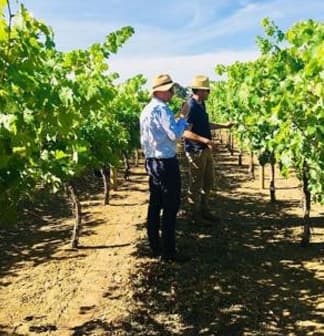OBJECTIVES AND SCOPE
As Créateurs de Convivialité, Pernod Ricard believes that our success is strongly linked to the way we do business, acting responsibly all along the supply chain, inspired by our corporate values: entrepreneurial spirit, mutual trust and sense of ethics.
Operating in more than 70 different countries, we rely on many suppliers across our supply chain, from farming and manufacturing through distribution and merchandising and acknowledge that some of our impacts on society and the environment is operated through our suppliers.
We bring good times from a good place and our suppliers play a vital role in ensuring we have a positive impact on the planet, the people and communities we work with and depend upon. By working together, we can create stronger business relationships. We believe it will strengthen both Pernod Ricard and our suppliers’ businesses by encouraging them to improve their practices and to assist them in doing so.
Recognizing that there are differences in laws, customs, and economic conditions that affect business practices around the world, we believe that shared values must serve as the foundation for relationships between Pernod Ricard and its suppliers.
By signing the Supplier Standards, we expect our direct suppliers to follow these standards and take appropriate measures for their implementation. Suppliers must also ensure that this document is observed by subcontractors and we encourage our suppliers to cascade expectations and diffuse their own document to their suppliers.
Pernod Ricard prefers a continuous improvement approach and can help develop ways and means together with the supplier provided Pernod Ricard receives information from the supplier within due time. If there is no commitment or lack of corrective measures, such may result in Pernod Ricard ceasing to do business and as a final resort terminating the contract.
Please take the time to read the Supplier Standards and understand your responsibilities so that together, we can build a strong partnership for the future.
STANDARDS
••••••••••••••••••••••••••••••••••••••••••••••••••••••••••••••••••••••••••••••••••••••••••••••••
1) Labour and Human Rights
Prohibit Discrimination
No discrimination shall be tolerated by the supplier in hiring, remuneration, access to training, promotion, termination or retirement, based on factors such as but not limited to gender, gender identity, gender expression, age, religion, race, caste, birth, social background, disability, ethnic, national or social origin, nationality, physical appearance, membership in workers’ organisations including unions, political affiliation or opinions, sexual orientation, family responsibilities, marital status.
Prohibit abuse and harassment
Workers shall be treated with dignity and respect and the supplier will not engage in any kind of harassment, threat, intimidation, bullying or abuse of any worker, including physical punishment or disciplinary measures and mental or physically coercion.
Prohibit Child Labour
In compliance with international standards, especially the ILO’s relevant Conventions, and national laws, Pernod Ricard will not employ underage children. Pernod Ricard does not permit child labour exploitation under any circumstances. We are aware that young people under 18 are entitled to work in certain defined and protected circumstances such as government- approved apprenticeship programmes. This is acceptable as long as it is conducted in line with the requirements of ILO conventions and national laws.
Prohibit Forced Labour
All forms of human trafficking and forced labour, such as withholding deposits, salary and benefits or the retention of identity documents from workers, are forbidden. Workers shall have the right to leave the workplace premises after completing the standard workday and be free to terminate their employment provided that they give reasonable notice to their employer.
Provide a Safe and Healthy Workplace Health and Safety
A safe and healthy workplace environment is provided, and the supplier takes effective steps to prevent potential accidents and injury to workers’ health occurring in the course of work or as a result of the employer’s operations, by minimizing the sources of hazards inherent to the work environment.
Apply Reasonable Working Hours
All applicable national laws and industry standards on working hours and public holidays are to be respected by the supplier. In the absence of applicable laws or collective agreements, normal working hours shall not on a regular basis exceed 48 hours and the maximum allowable overtime hours in a week shall not exceed 12 hours. Employees are entitled to at least one day of rest in every seven-day period.
Compensation
Compensation package includes wages paid, overtime pay, benefits and paid leave which meet or exceed legal minimum or appropriate prevailing industry standards. The supplier ensures that wage and benefits composition are detailed clearly and regularly for workers and are rendered in full compliance with all applicable laws. All overtime shall be reimbursed at a premium rate as defined by national law and/or industry standard. Compensation terms established by legally binding collective bargaining agreements are implemented and adhered to.
Respect Freedom of Association and the Right to Collective Bargaining
Workers have the right to or not to form, join, and organise trade unions of their choice and for them to bargain collectively on their behalf with the company. In situations where the right to freedom of association and collective bargaining are restricted under law, the company shall allow workers freely to elect their own representatives. Suppliers ensure that employee representatives do not suffer any discrimination, reprisal, intimidation or harassment.
Respect Land and water rights of communities
Suppliers follow all applicable national laws and respect international human rights standards related to the rights to land and natural resources ensuring land acquisitions, changes of use and use of land are made respecting the rights of the individual, indigenous people and local communities impacted. Acknowledging the right to water as a basic human right, we expect our suppliers to respect the human need for sustainable water supplies, safe drinking water, and protection of both ecosystems and communities through proper sanitation.
Signed document to be returned to the Pernod Ricard affiliate that originated the request. Please note that the signature is mandatory. In case of failure to comply with this requirement, this can lead to the termination of the partnership with Pernod Ricard.
••••••••••••••••••••••••••••••••••••••••••••••••••••••••••••••••••••••••••••••••••••••••••••••••
2) HEALTH AND SAFETY
Occupational Safety
Worker’s exposure to potential safety hazards (e.g., electrical and other energy sources, fire, on-site transport of any kind, and fall hazards) is to be controlled by risk assessment, administrative controls, preventative maintenance and effective safe work procedures, with appropriate safety training. Where hazards cannot be adequately controlled, workers are provided with appropriate, well-maintained, personal protective equipment. Workers are involved in identifying further safety concerns.
Emergency Preparedness
Potential emergency situations and events are to be identified and assessed. Policies, emergency plans and response procedures are to be in place which must include evacuation plans and exercise, fire detection systems, emergency reporting, employee notification, and recovery plans.
Occupational Injury and Illness
Procedures and systems are to be in place to drive risk assessment to prevent, protect, track, report and manage occupational injury and illness including provisions to encourage near-miss self-reporting by workers and the classifying and the recording of injury and illness. In addition, the investigation of each safety incident with the implementation of corrective actions to eliminate its root causes will reduce workplace safety incidents.
Sanitation, Food and Housing
Workers are provided with ready access to clean toilet facilities, drinkable water and sanitary food preparation, storage, and eating facilities. Worker accommodations, when provided by the supplier, are to be maintained, clean and safe, and provided with appropriate emergency exits. Hot water for bathing and showering, adequate heat and ventilation, and reasonable personal space along with reasonable entry and exit privileges are provided. These measures are under regular control to avoid the creation of new risks.
••••••••••••••••••••••••••••••••••••••••••••••••••••••••••••••••••••••••••••••••••••••••••••••••
3) ENVIRONMENTAL IMPACT
Environmental regulation
Suppliers must observe all applicable laws and regulation relating to the preservation of the environment in the countries in which they operate; from obtaining environmental permits from local authorities to the compliance with applicable limit thresholds.
Risk identification
The supplier shall examine, identify and assess the potential environmental risks and shall put in place all appropriate measures to minimize or eliminate them whenever possible.
Sustainable agriculture
The supplier shall promote the development of agricultural processes and technologies which respect the environment and shall endeavour to preserve biodiversity.
Product Restrictions
The supplier is to observe all applicable laws, regulations and customer requirements regarding prohibition or restriction of specific substances within the product or the packaging.
Water and wastewater
The supplier shall measure and optimize water consumptions, especially in water stress areas. The wastewaters of any kind shall be monitored, controlled and treated before discharge.
Climate, energy
CO2 emissions linked to combustion of fossil fuels, transport or any other activities having an impact on climate (refrigeration system, fertilizers use etc.) are identified, monitored, and actions are put in place by the Company to minimize them. For packaging or industrial products (alcohol, etc…), the supplier shall be able to provide the CO2 emissions factors (cradle to gate perimeter) associated with the product sold to Pernod Ricard.
Eco design
The supplier shall assess the environmental impact of its products and packaging during their whole life cycle, from the conception and the production to their use and end-of-life and strive to minimise this environmental impact along each step of the product lifecycle.
Signed document to be returned to the Pernod Ricard affiliate that originated the request. Please note that the signature is mandatory. In case of failure to comply with this requirement, this can lead to the termination of the partnership with Pernod Ricard.
Nuisances and waste
Noise, dust, odours, particles and all other sources of local nuisance are identified by the supplier and, when possible, minimised. All wastes shall be reduced at source, sorted, monitored and disposed of in a certified sorting or treatment centre.
Animal Welfare
The supplier shall not fund, conduct, or commission any tests on animals unless they are explicitly required by law.
••••••••••••••••••••••••••••••••••••••••••••••••••••••••••••••••••••••••••••••••••••••••••••••••
4) INTEGRITY AND FAIR BUSINESS PRACTICES
Bribery, Corruption and Conflicts of Interest
The highest standards of integrity are to be upheld by the supplier in all business interactions. Participants shall have a zero- tolerance policy towards any, and all, forms of bribery, corruption, extortion and embezzlement (covering promising, offering, giving or accepting any bribes). All business dealings should be transparently performed and accurately reflected on participant’s business books and records. Monitoring and enforcement procedures shall be implemented to ensure compliance with Pernod Ricard’s Code of Business Conduct, as well as anti-corruption laws, in particular French Sapin II Law).
Suppliers should not cause any conflict of interest for Pernod Ricard employees, and should avoid situations where a conflict of interest may occur. We expect suppliers to disclose in full any potential conflicts of interest they may have as soon as they have been identified, so that they can be properly considered, and the right action taken.
Business record and confidential information
Information regarding the supplier’s business activities, structure, financial situation and performance is to be disclosed in accordance with applicable regulations and prevailing industry practices.
Business, commercial and financial information regarding Pernod Ricard and its commercial partners must be treated as confidential and should not be disclosed to third parties without Pernod Ricard’s prior authorization and should be treated in compliance with the terms of any relevant clause provided in any agreement between the supplier and Pernod Ricard.
Intellectual Property
Intellectual property rights are to be respected by the supplier. The transfer of technology and know-how is to be carried out in a manner that protects intellectual property rights.
Open and Fair Competitive business environment
High standards of fair business, advertising and competition are to be upheld by the Company. Appropriate measures to safeguard customer information must be used. Suppliers must comply with competition and antitrust laws which apply to their business and to ours.
Tax evasion
Suppliers shall comply with all applicable tax laws, regulations and industry standards in the countries where they operate. Suppliers shall not engage in deliberate tax evasion or facilitate such evasion on behalf of others. As such, suppliers are expected to have in place adequate procedures and effective controls to minimize the risk of tax evasion or its facilitation, and to enforce them where appropriate. Suppliers must report any concerns in relation to tax evasion to their Pernod Ricard contact.
••••••••••••••••••••••••••••••••••••••••••••••••••••••••••••••••••••••••••••••••••••••••••••••••
5) RESPONSIBLE DRINKING
The products we create, market and promote bring people together and play a valuable role in society. However, one must never forget that the excessive or inappropriate consumption of our products by our consumers may generate risks for themselves and others. To ensure that consuming our products continues to be a safe and enjoyable experience, we encourage consumption in moderation and combat inappropriate forms of consumption whenever possible, in partnership with other industry members, non-profit organisations and public authorities.
Promoting the responsible consumption of our brands is part of our business ethics and we encourage our suppliers to raise their worker’s and the public’s awareness to responsible drinking.
All suppliers of services relating to the organization or sponsorship of events should ensure that there is a clear and visible responsible drinking message.
Signed document to be returned to the Pernod Ricard affiliate that originated the request. Please note that the signature is mandatory. In case of failure to comply with this requirement, this can lead to the termination of the partnership with Pernod Ricard.
••••••••••••••••••••••••••••••••••••••••••••••••••••••••••••••••••••••••••••••••••••••••••••••••
RAISING A CONCERN
We support a culture of speaking up without fear of retaliation against those who report actual or suspected breaches of any rules related to business conduct, compliance or ethics matters contained within or Code of Business Conduct or provided by any legal, accounting or regulatory requirements, policies and standards (the “Rules”).
Any concern from the supplier, his employees, managers, workers or any other stakeholders regarding these Rules or their application (including any failure by a Pernod Ricard employee or anyone acting on behalf of Pernod Ricard) should be reported to your Pernod Ricard contact who will ensure this concern is flagged in our secured tool “Speak Up”. Managed by an independent service provider, this tool can be used anonymously (where permitted by law) and is available in any languages via telephone or through the internet-based message interface, 24 hours a day, 7 days a week.
We take every report seriously and will not tolerate any reprisal by a Pernod Ricard employee against a supplier who has reported a concern in good faith or assisted us with an investigation. Pernod Ricard will investigate any concern raised in good faith. The supplier could be asked to assist with any such investigation and provide access to any information reasonably requested.
••••••••••••••••••••••••••••••••••••••••••••••••••••••••••••••••••••••••••••••••••••••••••••••••
REFERENCE DOCUMENTS
The Supplier Standards are based on the following international standards, guidelines and protocols:
- Universal Declaration of Human Rights
- International Covenant on Civil and Political Rights (ICCPR)
- International Covenant on Economic, Social and Cultural Rights (ICESCR)
- United Nation Convention Against Corruption (UNCAC)
- United Nation Sustainable Development Goals (SDGs)
- International labour Organization (ILO) eight fundamental conventions
- Other relevant UN conventions and declarations, including (but not limited to):o Declaration on the Elimination of Discrimination Against Women
o Declaration of the Rights of the Child
o Declaration on the rights of indigenous peoples
o Convention on the Protection of the Rights of All Migrant Workers and Members of their Families - Other international standards and guidelines, including (but not limited to):
o OECD guidelines for multinational enterprises;
o OECD-FAO Guidance for Responsible Agricultural Supply Chains
o OECD Convention on combating bribery of foreign public officials in international business transactions
o Ten Principles of the United Nations Global Compact;
o ILO’s Tripartite Declaration of Principles Concerning Multinational Enterprises and Social Policy;
o United Nations Guiding Principles on Business and Human Rights.
o The ISO 45001 standard
For further information please visit our website www.pernod-ricard.com to access our Code of Business Conduct, Supplier Standards, policies and our annual Sustainability reporting in our Registration Document
Supplier Information Form can be found here.





